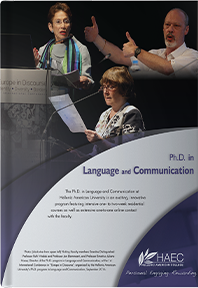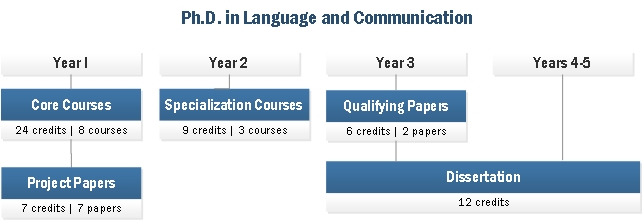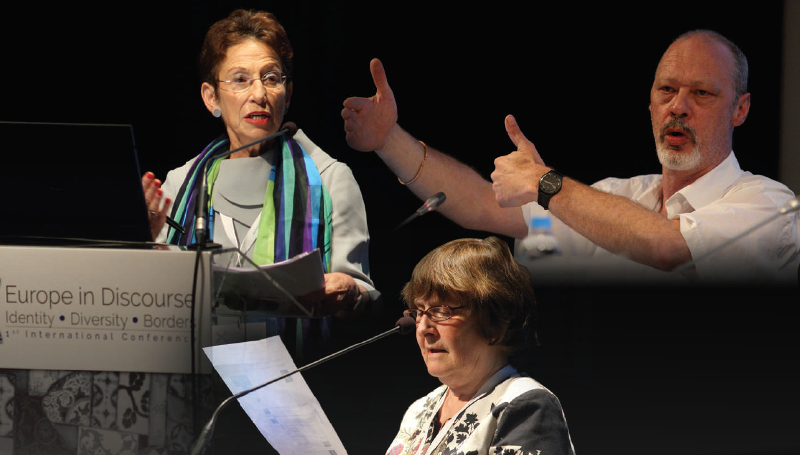"Nowhere in the world are PhD students given the opportunity to study and work with so many internationally renowned scholars."
The PhD program was originally developed by Basil Hatim with the support of Advisory Council members such as Carol Chappelle, the late Eugene Nida and late Christopher Candlin. It is chaired by Professor Juliane House. As a student in the Program you will benefit from the teaching and guidance of such internationally renowned scholars as:
- Vijay Bhatia (University of Hong Kong)
- † Jan Blommaert (University of Tilburg)
- Juliane House (Hellenic American University)
- Zhu Hua (University of Birmingham, UK)
- Cornelia Ilie (Malmö University)
- Daniel Kadar (Dalian University of Foreign Languages, China and Research Institute if Linguistics, Hungary)
- Zohar Kampf (Hebrew University of Jerusalem)
- Gabriele Kasper (University of Hawaii)
- Claire Kramsch (University of Berkeley)
- Rosina Marquez Reiter (The Open University, UK)
- Lourdes Ortega (Georgetown University)
- James E. Purpura (University of Columbia)
- Philip Scholfield (University of Essex)

Strengths of the PhD in Language and Communication Program
The PhD program is a highly flexible program that combines short-term intensive courses on campus with ongoing guidance and supervision from faculty as you write your project and qualifying papers, conduct your research and complete your PhD thesis. The structure of the program thus allows you, if you wish, to work while enrolled in the program.
Our strengths include:
- Residential, on campus, core and strand courses that guide students though the formulation of their research agenda
- Star faculty from universities of Europe, Canada and USA who teach and supervise you as you work towards the completion of your PhD dissertation
- Option to specialize in Second Language Education (SLE), Intercultural and Professional Communication(IPC) or Translation and Interpreting (TI)
- Wide exposure to a broad spectrum of research themes, including discourse analysis, foreign language teaching and assessment, translation and interpreting
- Systematic exposure to Quantitative and Qualitative Research Methods and training in the use of software such as SPSS
- Broad perspective in language that enables you to gain a broad understanding of language in use, beyond your area of specialization
- Opportunities to publish your research and attend conferences
- Faculty mentoring and personal support for your academic and professional development
Student Profiles
We are proud of our student body and the diversity of academic and professional backgrounds they represent. Students work or have worked in second language education, translation and interpreting, law, business, political science, diplomacy, linguistics, and other areas in which language and communication is of prime importance. Together, our students make the program truly interdisciplinary in orientation.
If you already work you can continue doing so while enrolled in the program. In fact, you are encouraged to draw upon your work experience to highlight issues of professional practice in your courses, and to apply insights that you gain in the PhD program to the challenges you face in your work.
More about the program
The program is normally competed in 4 to 5 years and includes coursework, research and a dissertation, for a total of 58 credits.
Specifically, you will need to complete:
- 8 core courses, together with 7 project papers
- 3 discipline-specific seminars
- 2 qualifying papers and
- the PhD dissertation
During the first year of the program you attend eight week-long intensive seminars held on campus, during which you gain insights into topics such as Research Methodology, Discourse Analysis, Critical Applied Linguistics, Sociolinguistics and Communication across Cultures. During the interim between residencies you work on a project paper related to the course you have just finished.
You can then begin to specialize by taking 3 courses in one of three strands: Second Language Education, Intercultural and Professional Communication and Translation Studies.
You receive close attention from you supervisor as you then develop your Qualifying Papers and finally your dissertation, your own unique and creative contribution to knowledge. Consult the Hellenic American University website for a detailed list and description of courses in the degree program.

Upon completing your PhD studies in the PhD in Language and Communication you will be able to:
- design and carry out original research
- effectively use datasets and select the methodology appropriate for a research project
- use advanced analytical skills to synthesize information, data and existing contributions in a newly conceived research project
- design research proposals for seeking funding
- continue your studies at a post-doctoral level, if you so wish.
Career Paths
A key commitment of the PhD program is to maintain the highest academic standards while staying informed about ongoing professional developments in a highly versatile and competitive job market. With its focus on language-in-use from a wide range of disciplinary fields, the PhD program in Language and Communication at Hellenic American University can prepare you for a wide variety positions in teaching and research.
During your studies you will also gain insights into international and intercultural challenges such as global inequalities, economic dependency, conflict and globalization. With knowledge of the growing importance that language plays in decision-making and communication as well as in lobbying and leadership, our curriculum and faculty can also prepare you for a career in diplomacy, lobby organizations, NGO’s and think tanks.
Publications & Conference Attendance
The PhD program in Language and Communication allows you to participate in ongoing faculty-student research projects and provides you with opportunities and guidance to publish your work in peer-reviewed journals and international conferences.
Admission requirements are the same as those in all other Hellenic American University graduate programs with the following exceptions:
- You should already hold a master’s degree
- You will be asked to submit 3 reference letters
- You will also need to submit a sample of academic writing
